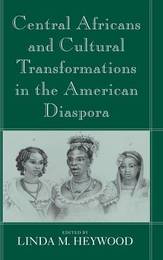
|
Central Africans and Cultural Transformations in the American Diaspora
Hardback
Main Details
| Title |
Central Africans and Cultural Transformations in the American Diaspora
|
| Authors and Contributors |
Edited by Linda M. Heywood
|
| Physical Properties |
| Format:Hardback | | Pages:402 | | Dimensions(mm): Height 229,Width 152 |
|
| Category/Genre | African history
Slavery and abolition of slavery |
|---|
| ISBN/Barcode |
9780521802437
|
| Classifications | Dewey:306.089967 |
|---|
| Audience | | Professional & Vocational | |
|---|
| Illustrations |
28 Tables, unspecified; 12 Maps; 8 Halftones, unspecified; 1 Line drawings, unspecified
|
|
Publishing Details |
| Publisher |
Cambridge University Press
|
| Imprint |
Cambridge University Press
|
| Publication Date |
26 November 2001 |
| Publication Country |
United Kingdom
|
Description
This volume sets out a new paradigm that increases our understanding of African culture and the forces that led to its transformation during the period of the Atlantic slave trade and beyond, putting long due emphasis on the importance of Central African culture to the cultures of the United States, Brazil, and the Caribbean. Focusing on the Kongo/Angola culture zone, the book illustrates how African peoples re-shaped their cultural institutions as they interacted with Portuguese slave traders up to 1800, then follows Central Africans through all the regions where they were taken as slaves and captives.
Reviews"...an exemplary collection of essays, presenting new information and interpretations that fundamentally revise and deepen our understanding of the slave trade and the African diaspora." American Historical Review "[T]he overall architecture of this book is strong and telling. Graduate students and faculty." Choice "This path-breaking volume is a long overdue illumination of Central African influences on the slave cultures of the Americas and a refreshing reassessment of the transmission of African ideas, beliefs, and rituals...the essays represent an important launch pad for the debates that will no doubt shape slave studies well into the future. For those engaged in slave studies, this book will be indespensable." Transforming Anthropology
|